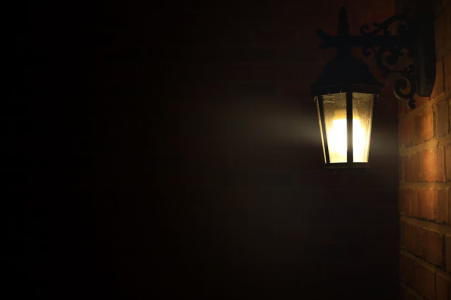Think it’s harmless? This appliance might be draining more than just power at night
- Replies 0
There’s something quietly revealing about the way a house looks after dark, when its glow cuts through the stillness and hums softly into the street.
You might not think twice about the lights that linger through the night, but somewhere in that subtle glow hides a habit that drains more than it gives back.
Beneath what feels comforting and secure, there’s a cost that builds slowly—not just in bills, but in energy, peace, and even the patience of those who live nearby. Sometimes the smallest, most familiar rituals are the ones quietly holding us back the most.
While many see a porch light as a warm symbol of welcome and safety, experts say it’s a deceptive comfort.
What feels like protection can actually drain your wallet, disturb your neighbors, and even make your home less secure.
As it turns out, the one household fixture that should always go dark at night is the humble outdoor light—the porch lamp that burns long past midnight.
According to Moon and Garden, turning off your porch light before bed isn’t just about saving energy—it’s about breaking an overlooked habit.

Each exterior bulb left glowing for hours pulls steadily from the grid, straining both your budget and your community’s energy use.
Danny Niemela from ArDan Construction explains that a single 60-watt bulb burning twelve hours every night can add nearly $20 a year to your bill, and multiple fixtures can send that number soaring to $100 or more.
Motion sensors and timers, he notes, do the same job for a fraction of the cost. Beyond finances, the illusion of safety that constant lighting provides can backfire in surprising ways.
Poorly placed beams can actually spotlight door locks and side gates, helping potential trespassers plan their moves.
Read also: 5 things that drain the most electricity in your home
Bright glares can also blind camera sensors or make it harder for you to notice movement outside. Criminals, experts warn, often read lighting patterns—and a porch that glows at 3 a.m. can signal an empty house rather than a secure one.
As if that weren’t enough, there’s a quieter nuisance drawn to that light—insects. Swarms gather near the warmth of bulbs, fluttering toward doors and windows, leaving behind wings, bites, and mess for homeowners to find in the morning.
Turning off your porch light can drastically cut down on those nighttime invasions, especially during warmer months when bugs thrive. Experts even recommend opting for enclosed, downward-facing fixtures or warm-toned bulbs that reduce glare and heat.
Energy advisors say that awareness is the first step to cutting waste. Laura Court-Jones, Small Business Editor at Bionic, suggests several habits that can help you go further:
Read also: The 9 senior-smart habits to make your home the cleanest of the year (and put your safety first)
lowering your thermostat by one degree, turning off unused appliances, installing a smart meter, and occasionally comparing energy suppliers for better rates. Each step, she says, creates a small but lasting difference in how households manage their consumption.
Tiny habits add up, and shutting off one outdoor light can be the beginning of a bigger shift.
But the story doesn’t end at your electric bill—it extends to your street. Light trespass, or the spillover of your outdoor brightness into others’ homes, can interrupt sleep and fray neighborly patience.
What feels like harmless security can become a steady beam of irritation through someone else’s bedroom curtain. Turning off that porch light at night isn’t just about being energy-smart; it’s also about being considerate.
Read next:

Do you keep your porch light burning through the night, or are you ready to let it rest till morning? Maybe this is the perfect time to try darkness as a new kind of defense—one that saves energy and goodwill at once. Share your thoughts below and tell us if you’ll be switching yours off tonight.
You might not think twice about the lights that linger through the night, but somewhere in that subtle glow hides a habit that drains more than it gives back.
Beneath what feels comforting and secure, there’s a cost that builds slowly—not just in bills, but in energy, peace, and even the patience of those who live nearby. Sometimes the smallest, most familiar rituals are the ones quietly holding us back the most.
While many see a porch light as a warm symbol of welcome and safety, experts say it’s a deceptive comfort.
What feels like protection can actually drain your wallet, disturb your neighbors, and even make your home less secure.
As it turns out, the one household fixture that should always go dark at night is the humble outdoor light—the porch lamp that burns long past midnight.
According to Moon and Garden, turning off your porch light before bed isn’t just about saving energy—it’s about breaking an overlooked habit.

Think it’s harmless? This appliance might be draining more than just power at night. Image source: Jarrod Reed / Unsplash
Each exterior bulb left glowing for hours pulls steadily from the grid, straining both your budget and your community’s energy use.
Danny Niemela from ArDan Construction explains that a single 60-watt bulb burning twelve hours every night can add nearly $20 a year to your bill, and multiple fixtures can send that number soaring to $100 or more.
Motion sensors and timers, he notes, do the same job for a fraction of the cost. Beyond finances, the illusion of safety that constant lighting provides can backfire in surprising ways.
Poorly placed beams can actually spotlight door locks and side gates, helping potential trespassers plan their moves.
Read also: 5 things that drain the most electricity in your home
Bright glares can also blind camera sensors or make it harder for you to notice movement outside. Criminals, experts warn, often read lighting patterns—and a porch that glows at 3 a.m. can signal an empty house rather than a secure one.
As if that weren’t enough, there’s a quieter nuisance drawn to that light—insects. Swarms gather near the warmth of bulbs, fluttering toward doors and windows, leaving behind wings, bites, and mess for homeowners to find in the morning.
Turning off your porch light can drastically cut down on those nighttime invasions, especially during warmer months when bugs thrive. Experts even recommend opting for enclosed, downward-facing fixtures or warm-toned bulbs that reduce glare and heat.
Energy advisors say that awareness is the first step to cutting waste. Laura Court-Jones, Small Business Editor at Bionic, suggests several habits that can help you go further:
Read also: The 9 senior-smart habits to make your home the cleanest of the year (and put your safety first)
lowering your thermostat by one degree, turning off unused appliances, installing a smart meter, and occasionally comparing energy suppliers for better rates. Each step, she says, creates a small but lasting difference in how households manage their consumption.
Tiny habits add up, and shutting off one outdoor light can be the beginning of a bigger shift.
But the story doesn’t end at your electric bill—it extends to your street. Light trespass, or the spillover of your outdoor brightness into others’ homes, can interrupt sleep and fray neighborly patience.
What feels like harmless security can become a steady beam of irritation through someone else’s bedroom curtain. Turning off that porch light at night isn’t just about being energy-smart; it’s also about being considerate.
Read next:
- Why people are still painting porch ceilings blue—and the reason might surprise you
- The surprising trend changing neighborhoods—and what it could mean for you
Key Takeaways
- Leaving your porch light on overnight might seem harmless, but experts reveal it wastes energy, invites bugs, and can even reduce security rather than enhance it.
- Turning it off helps conserve electricity, save money, and cut down on light pollution that disturbs both sleep and local wildlife.
- Professionals suggest using motion sensors, timers, or downward-facing fixtures to strike a balance between safety and efficiency.
- Ultimately, small nighttime choices like switching off one light can make homes calmer, bills lighter, and neighborhoods friendlier.






